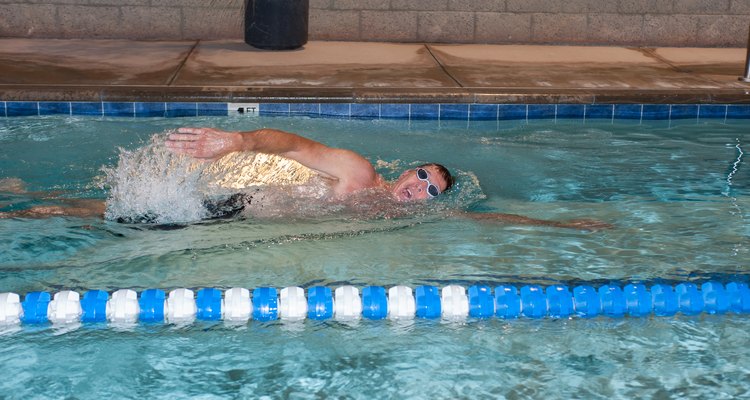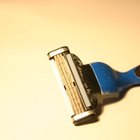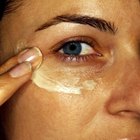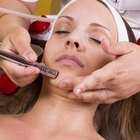
Motionshooter/iStock/Getty Images
Acne is caused by clogged pores, usually on your face, neck, chest or back. These areas are more prone to developing acne because they have the largest oil glands, according to Ethel Sloane, author of "Biology of Women." Swimmers may be more prone to acne for several reasons.
Chlorine and Pool Chemicals
Some swimmers are sensitive to chlorine and other chemicals used to keep pools clean and sanitary. The chemicals can irritate and dry their skin, causing the skin to increase its oil production. If chlorine bothers your skin, try moving your swimming workouts to the local lake or the ocean. When you must swim in a pool, apply a light layer of lotion on your skin before you enter the pool to protect it from drying, and shower immediately after exiting the pool to rinse away the chemicals.
Sunscreen
Some swimmers have acne as a result of sunscreen use. Some sunscreens can irritate the skin or clog pores. Don't stop using sunscreen just because you have acne, however. Instead, look for a sunscreen that is labelled "non-comedogenic," which means that it will not clog your pores and cause acne. You may have to experiment with several kinds of lotion before you find one that does not irritate your skin. Alternatively, try using a sunscreen that is just meant for your face. These sunscreens often have a milder formula and are specially designed to be non-irritating to delicate facial skin.
Sun Exposure
Swimmers who spend the majority of their time swimming outside can experience increased acne from sun exposure. Some people believe that the sun dries up breakouts, but this isn't true, according to Katie M.D. Rodan and Kathy Fields, authors of "Unblemished." Sun exposure can cause you to sweat more, as well as cause your skin to dry out. Both of these situations can lead to increased acne. To combat the effects of the sun, as well as reduce your risk for contracting skin cancer, use a non-comedogenic sunscreen.
When to Consult a Dermatologist
If your acne is persistent and does not respond to your efforts to protect your skin from the sun and damaging chemicals from sunscreen or the pool, contact your dermatologist. She may be able to recommend a topical treatment or antibiotic that can help clear up your acne. Alternatively, if your skin becomes red and irritated from the pool in addition to your acne, consult your physician. You may have eczema, an ailment characterized by redness and irritation when it is triggered by contact with an allergen or other stimulus like heat.
Related Articles

What Are the Advantages & Disadvantages ...

Thigh Rash from Football Pads

How to Get a Pimple to Go Away Fast

How to Prevent Pock Holes From ...

Side Effects of Certain Dri

Is it Better to Tan With or Without ...

How to Use Noxzema for Shaving

How to Even Out Skin Tone Without Makeup

Skin Problems Caused by Swimming Pool ...

Help With Chapped Red Cheeks

How to Get Rid of Irritation After ...

How to Heal an Inflamed Bikini Area

The Best Facial Moisturizer That Won't ...

How to Remove the Smell of Cologne From ...

Is It Better to Wash Your Face With Hot ...

How to Have Flawless Armpits

Are There Ways to Get Rid of Blocked ...

How to Protect a Tattoo From the Sun

Does Sweating From Exercise Help With ...

Fraxel Laser Treatment Dangers
References
- "Biology of Women": Ethel Sloane
- "A Woman's Complete Guide to Natural Health": Lynne Paige Walker and Ellen Hodgson Brown
- "Unblemished": Katie M.D. Rodan and Kathy Fields
Writer Bio
Natalie Smith is a technical writing professor specializing in medical writing localization and food writing. Her work has been published in technical journals, on several prominent cooking and nutrition websites, as well as books and conference proceedings. Smith has won two international research awards for her scholarship in intercultural medical writing, and holds a PhD in technical communication and rhetoric.
Photo Credits
Motionshooter/iStock/Getty Images